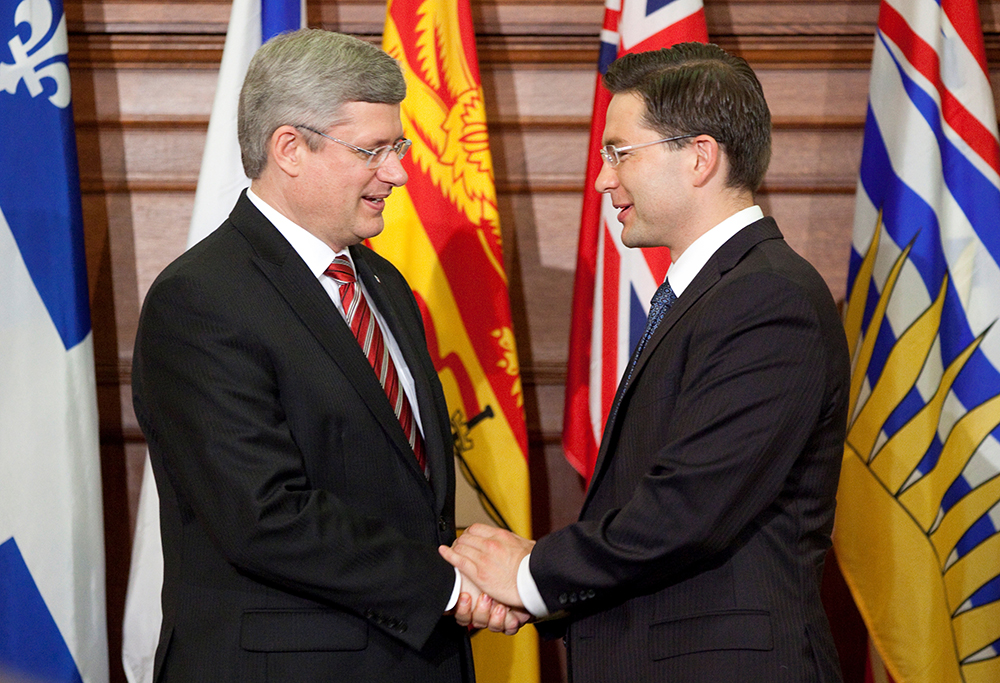For the second time in just over two years, the Conservative Party of Canada is getting a chance to hit the reset button.
The first time they opted for the hapless Andrew Scheer. The choice reflected the mistaken notion that you can have change without change.
Here’s why they’ll blow it again and jam the Batmobile into reverse with a leader like Pierre Poilievre, Rona Ambrose, Peter MacKay or some other retread from the party’s glory days.
And should the June 2020 leadership convention in Toronto turn into a civil war between red and blue Tories, Stephen Harper himself may even reappear. But it must be said that would be the start of a death march.
Although the party has now laid out some of the ground rules for potential candidates — requiring a $200,000 non-refundable registration fee, a $100,000 compliance fee and 3,000 signatures from party members across the country — it is still silent on the biggest issue of all: what voting system will the party use at its convention?
That issue is crucially important. The party used the ranked ballot system in the 2017 race that saw Scheer win in the 13th round of voting. Supporters of some other candidates raised concerns about fraud and corruption in the wake of the results. The party added to the controversy by destroying the ballots after the leader was chosen, making verification of the results impossible. (Despite party claims that Deloitte “audited” the result, the consulting firm in fact only provided “independent observation of certain processes,” adding to concerns.)
Whatever happens with the voting system, the Conservative party continues to be haunted by the spectre of Harper, who led them to three national victories on the improbable basis of his northern Republican policies. Even though Harper was trounced by Justin Trudeau in 2015, he has never really released his grip on the party he built.
Far from it.
Harper still pulls the strings in the party’s backrooms through his powerful position in the party’s fundraising arm, the Conservative Fund. Money continues to be the mother’s milk of politics, especially Conservative politics.
Harper is also the head of the International Democratic Union, a right-wing organization headquartered in Munich working to elect neo-conservative political parties around the world. In a way, the business of the IDU is to influence everyone’s election. Like the Russians, but with different tools.
In the wake of his defeat, Scheer had vowed to fight to keep his job — until leaks from Conservative party sources revealed the party was subsidizing his children’s private school fees. Never mind that the party’s executive director, Dustin Van Vugt, had approved the expenditures. It was off with his head, too. The party ordered a forensic audit on the guy it was pushing for prime minister just a few short months earlier — honest, affable, trustworthy Andy.
It’s not clear who leaked the damaging information, known only to relatively few in the party.
But reports — again based on anonymous sources — quickly emerged that Harper was “furious” about the expenses.
Sound familiar? It should.
Leaks from unnamed senior Conservative party sources portrayed Senator Mike Duffy as a scoundrel living off a fat public expense account, who then took a $90,000 cheque from Harper’s chief-of-staff to put things right that were never wrong. Duffy was tossed out of caucus and faced 31 criminal charges. The Crown failed to win a single conviction.
And Duffy wasn’t the only one to feel the wrath of Steve. Information sent directly to the RCMP from Harper’s PMO in 2010 triggered a major criminal investigation into former Conservative cabinet minister Helena Guergis and her husband Rahim Jaffer. Harper kicked Guergis out of caucus, effectively ending her political career.
Despite the salacious allegations, the RCMP investigated and decided there were no grounds to lay charges.
Even during his Reform Party days, Harper used expense account issues to attack leader Preston Manning. The party had established a personal expense account for Manning. Harper made a public issue out of it in 1994, attacking his leader for spending money on personal items like clothes and travel when Reform members were being asked to forego perquisites as MPs. Harper’s attack on Manning earned him a formal rebuke from the Reform Party’s executive council.
That’s the problem for today’s Conservatives. They have never rebuked Harper, his policies, his values, or his political style, even though Canadians have rejected Harperism and all it stands for in the past two federal elections.
The party’s attempt to carry on with the Harper legacy has been costly. If ever a prime minister was ripe for the picking, it was Trudeau in the last election. The SNC-Lavalin fiasco and the damning report of the ethics commissioner; the dubious pipeline purchase; the freebie junket to the Aga Khan’s island; the fumbling and stumbling on the international stage — it all offered an empty net for the attacking Conservatives.
They famously missed it, but it wasn’t because Scheer couldn’t shoot straight. It was because voters believed that the successor-minions were just Harper redux. In other words, worse than Trudeau. So voters chastised the prime minister instead of dumping him.
Political parties who lose back-to-back national elections do not normally stand pat. So instead of changing the message, the messenger and the tone, all three of which need to be done if their party is to win again, what did the Conservatives do?
Instead of following through with a policy convention planned for this April, which would at least give Canadians some idea of whether or not defeat had taught the Conservatives anything, they cancelled that event and decided to appoint a political coroner to sift through the bones of Election 2019.
They chose John Baird, the hoary former Harper cabinet minister, to carry out an “independent” review of how the Tories blew their chance at power in 2019.
An interesting choice, as Baird is a dyed-in-the-wool Harper loyalist. During Baird’s run as foreign minister, Canada managed to cut foreign aid to poor countries, disparage the United Nations and sell off diplomatic properties as though they were part of a fast food chain. NDP foreign affairs critic Paul Dewar called Baird a “freeloader” after it was revealed that in 2012 the minister and six friends holidayed for free at the official residence of Canada’s High Commissioner in London. Baird lamely pointed out that he paid for drinks and cabs.
As well as doing the election review, Baird is running the leadership campaign of another former Harper cabinet minister and loyalist, Pierre Poilievre. Baird’s helper? The redoubtable Jenni Byrne, once described as “Harper’s enforcer” and the party’s campaign manager for the federal elections in 2011 and 2015.
Poilievre is running on pure gall. He’s known as Skippy around Parliament Hill and responsible for the Conservatives’ much criticized Fair Elections Act. He was the guy who said “Fuck you guys” to his political opponents during a committee meeting on proposed legislation. And he was the deep thinker who told TV host Evan Solomon that the root cause of terrorism is terrorists. Really.
The trouble with Skippy, and former colleagues like Rona Ambrose and Peter MacKay, is that they are zombie relics of the Harper past. They are all former ministers who served a government that hated the press, suffocated the flow of government information, walked away from the Kyoto Accord, stifled scientists, sucked up to the energy industry and ran up the national debt over 10 years while professing to be fiscal conservatives. They all sat around the Harper cabinet table like bobbleheads.
Any claim of a changed Conservative party is mostly smoke. The party continues to be the creature of the Western energy economy. Its political fuel continues to be Western alienation. That’s why all of the usual suspects from the Harper crypt will be standing on their hands to point out their western roots. (In Poilievre’s case, the Ottawa MP will remind people that his father is “Fransaskois” — a francophone living in Saskatchewan.)
Any new party leader who served with Harper will be trying to hold together his original coalition — which means never winning the country.
There is one possible hope for a different direction, an outsider named Jean Charest who is flirting with a leadership bid. The former Mulroney cabinet minister and Quebec premier never operated under the shadow of Stephen Harper. Though he has baggage of his own, Charest could change the party’s hopelessly out-of-date policies on the environment and social issues without having to explain why he once supported them. None of the others can do that.
Seamlessly bilingual, deeply experienced and steeped in Quebec and national politics, Charest could modernize the party, enhance its credibility, and extend its reach enormously.
He could transform it overnight — and over Stephen Harper’s dead body. ![]()
Read more: Politics, Federal Politics, Elections
















Tyee Commenting Guidelines
Comments that violate guidelines risk being deleted, and violations may result in a temporary or permanent user ban. Maintain the spirit of good conversation to stay in the discussion.
*Please note The Tyee is not a forum for spreading misinformation about COVID-19, denying its existence or minimizing its risk to public health.
Do:
Do not: